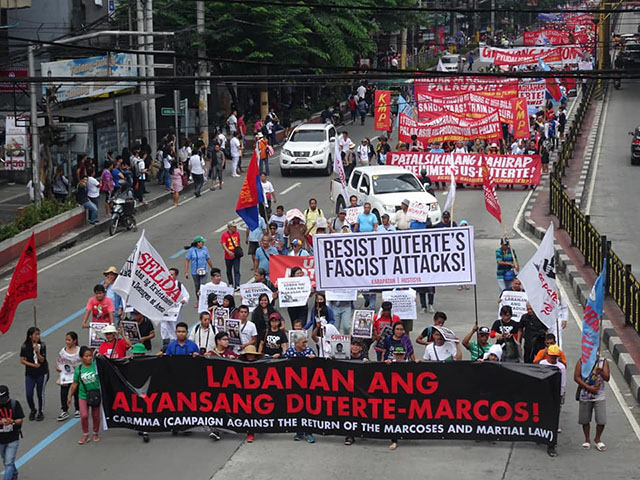Remembering Martial Law: Media Repudiate Attempts to Revise History
THOUSANDS OF protesters from different groups and sectors gathered at Manila’s Luneta Park last September 21, united by the call “never forget, never again” to Martial Law. Forty-six years ago to the day, President Ferdinand Marcos had signed Proclamation 1081, which marked the beginning of 14 years of tyrannical rule, state-sponsored violence against regime critics and dissenters, and unprecedented corruption and cronyism.
Apart from advisories on traffic and class suspensions in Manila, there was hardly any reporting done on the approaching milestone before Friday, September 21. But media covered the different activities on the day itself, as Filipinos recalled one of the darkest periods in Philippine history.
Media did more than just report what people did or said at these events. The press fact-checked contending claims, contradicted the attempts of some politicians to revise history, and published op-ed pieces to set the record straight about what really happened during the Marcos dictatorship.
CMFR monitored reports from the three national broadsheets Manila Bulletin, the Philippine Daily Inquirer and The Philippine Star; the primetime newscasts 24 Oras (GMA-7), Aksyon (TV5), News Night (CNN Philippines), TV Patrol (ABS-CBN 2), cable news channel ANC’s programs; and the online news sites Rappler and InterAksyon from September 17 to 23, 2018.
Day of protest
Setting aside their differences, a number of sectoral groups and civil society organizations joined forces and held protests across the country. The media, especially broadcasting, reported these protests, but also highlighted other activities meant to remind the nation of what happened 46 years ago.
Masses were celebrated in several churches in Manila to mark the occasion and the role that the religious sector played in ousting Marcos. (“Kaliwa’t kanang misa idinaos sa ika-46 anibersaryo ng Batas Militar”)
InterAksyon introduced the “Memory Project,” a compilation of digital recordings of the affidavits of human rights abuse victims curated by journalists. Inquirer.net featured Ateneo De Manila University’s (ADMU) digital martial lawmuseum.ph, while Rappler reported the plans of Commission on Human Rights’ (CHR) to build a Martial Law museum and memorial in the University of the Philippines Diliman, where September 21 had been designated as the UP Day of Remembrance. (“Listen to accounts of Martial Law torture victims with ‘Memory Project’,”“Ateneo virtual museum assures no whitewash of despot’s sins,” “Plans for Martial Law victims, martyrs memorial move forward”)
Enrile’s counter-narrative
Some political figures persisted in claiming that the period was a time of peace and prosperity. Since Duterte’s rise to power, the Marcoses and their allies have promoted their version of history, along with the bold pursuit of Ferdinand “Bongbong” Marcos Jr.’s political ambitions by contesting the electoral victory of Vice President Maria Leonor “Leni” Robredo in 2016.
On September 20, the eve of the anniversary, Bongbong Marcos released a two-part video interview, “Enrile: A Witness to History,” on social media. A one-on-one conversation between former Senate President Juan Ponce Enrile who had served as defense secretary during the Marcos years, and Marcos Jr. the show duplicated the Duterte-Panelo September 11 “tete-a-tete,” and was clearly designed to present their version of what happened during martial law. (“ENRILE: A WITNESS TO HISTORY | Bongbong Marcos”)
Activists and historians alike were quick to criticize Enrile’s account. Media organizations aired the testimonies of activists who had experienced first-hand the abuse that Enrile denied happened.
In ANC’s Headstart, for example, former Social Welfare Sec. Judy Taguiwalo accused him of distorting history and pointed out that Enrile had helped concoct the justifications for Martial Law.
Former Commission on Human Rights Chair Etta Rosales also belied Enrile’s claims that Marcos was a “reluctant dictator,” citing an essay the dictator had written while a law student in UP in which he envisioned a “new society” through an “authoritarian government.” (“Marcos not a reluctant dictator, Etta Rosales rebuffs Enrile,”“Enrile distorting martial law history: ex-DSWD chief”)
Primetime newscasts also debunked Enrile’s claims, featuring interviews with, among others, former senator Aquilino Pimentel III, ADMU history professor Francis Gealogo, and Anakpawis Rep. Ariel Casilao.
Cheers!
CMFR cheers several online news websites for their reports that fact-checked Enrile’s claims. Rappler published a three-part series that slammed Enrile’s claims that Filipinos could watch news freely, and that there were no massacres and no arrests during martial rule. CNN Philippines also contradicted Enrile’s claim that Marcos introduced land reform by citing Constitutional Convention delegate Christian Monsod, who said that while Marcos did have such a program, agriculture was so firmly in the hands of his cronies that it was doomed to fail. PhilStar.com questioned Enrile’s allegation that the opposition had fabricated the Jabidah massacre and that the media were controlled by oligarchs. (“8 things Juan Ponce Enrile, Bongbong Marcos got wrong about martial law,” “Fact-checking Enrile’s tete-a-tete with Bongbong Marcos,” “FALSE: Filipinos ‘free to roam, can watch news’ during Martial Law”)
Based on the testimonies of survivors, TV Patrol’s special report on torture during martial law was equally notable. Historian Xiao Chua provided a list of the fourteen commonly used forms of torture, ranging from electric shock to sexual abuse. The accounts of writer Jose “Pete” Lacaba and teacher Fe Mangahas gave victims of the abuses during martial law a human face. (“TV Patrol: Mga paraan ng torture na ginamit sa batas militar ni Marcos”)
The Star’s September 21 editorial said more people were commemorating the anniversary of that dark period “because they perceive dark clouds forming again in the horizon.” Several columnists from the broadsheets also called out Marcos and Enrile for their attempts at historical revisionism.
All these deserve commendation, in furtherance of the need to remember what transpired in the past as the antidote to repeating it.

Leave a Reply